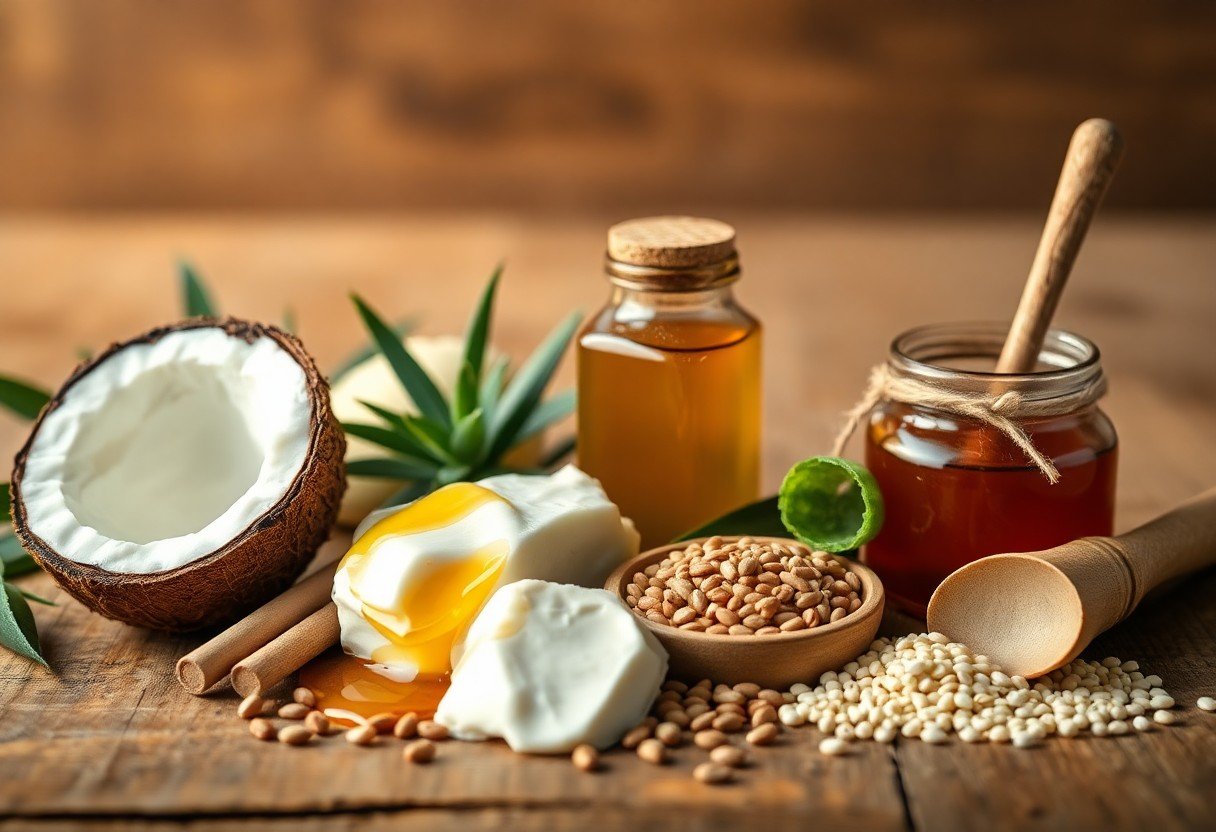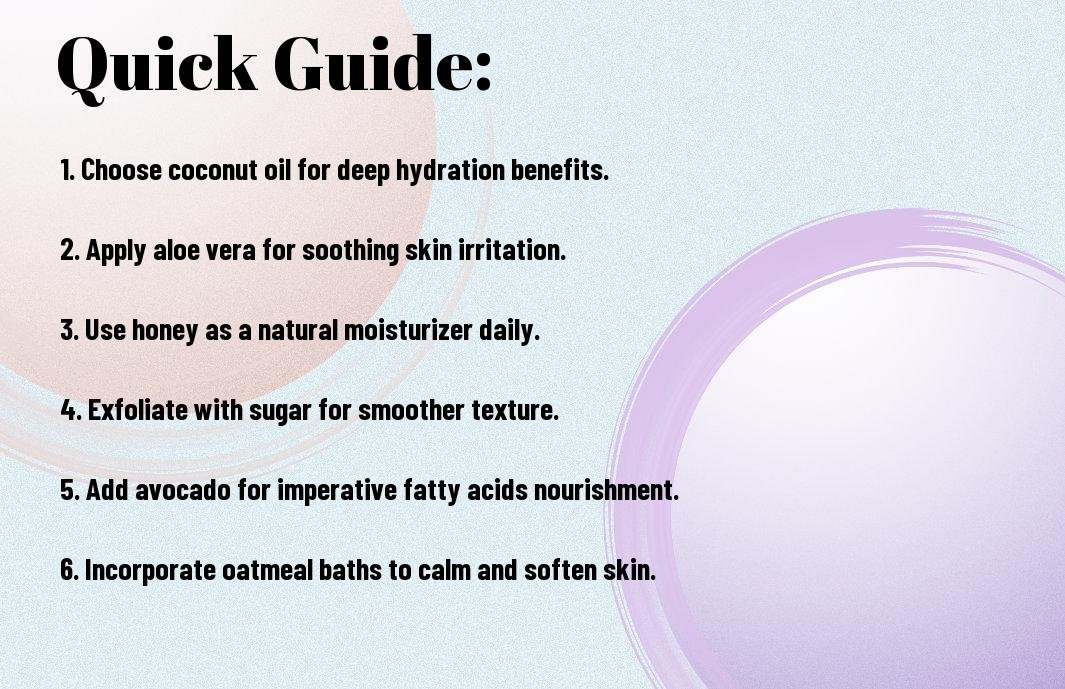Skin health is important for your overall well-being, and opting for natural ingredients can make a remarkable difference in achieving softer, smoother skin. In this guide, you’ll discover some of the most effective and gentle natural ingredients that not only moisturize but also provide lasting nourishment. Armed with this knowledge, you’ll be able to choose the right products and create your own skincare regimen, fostering a vibrant complexion and enhancing your self-care routine.
Table of Contents
Key Takeaways: Top 5 Natural Ingredients for Softer Skin
- Shea Butter: Rich in vitamins A and E, it deeply moisturizes and nourishes the skin, making it softer and more supple.
- Coconut Oil: Known for its hydrative properties, it effectively locks in moisture and provides a smooth texture to the skin.
- Aloe Vera: This natural ingredient soothes and hydrates, promoting softness while also healing irritation and dryness.
- Jojoba Oil: Mimicking the skin’s natural oils, it absorbs easily and helps maintain hydration, leading to a softer appearance.
- Honey: A natural humectant, it attracts moisture and helps retain it, keeping the skin soft and hydrated.

Types of Natural Ingredients for Softer Skin
To achieve softer skin, you can explore a variety of natural ingredients that cater to different skin concerns and needs. Each type brings its own unique benefits, making it important to select the right ones for your skin type. Here’s a quick overview:
| Type of Natural Ingredient | Benefits |
|---|---|
| Oils and Butters | Nourishes and moisturizes your skin |
| Exfoliants | Removes dead skin cells, revealing smoother skin |
| Hydrating Agents | Attracts moisture to the skin for lasting hydration |
| Essential Oils | Provides aromatic benefits and can improve skin appearance |
| Botanical Extracts | Offers a range of nutrients and antioxidants |
Knowing which natural ingredients work best for your skin will help you create an effective skincare routine that promotes softness and health.
Oils and Butters
The world of oils and butters is rich and varied, featuring options like coconut oil, shea butter, and argan oil, each renowned for their moisturizing properties. These natural ingredients are excellent for sealing in moisture, making your skin feel supple and nourished. For instance, coconut oil is known for its deep penetration and antimicrobial properties, while shea butter offers a luxurious texture that melts seamlessly into the skin. For highly recommended products, try 5 Best Shea Butter Products for Deep Moisturization.
Furthermore, the fatty acids contained in these butters and oils help repair and maintain your skin’s natural barrier, contributing to a softer feel over time. You can easily incorporate these into your routine as part of your moisturizer or use them directly on dry patches to experience their full benefits. To explore more options, check out 5 Best Coconut Oil Skincare Products.
Exfoliants
Natural exfoliants are necessary in any skincare regimen that aims for softness. Ingredients like sugar, coffee grounds, and oatmeal help to gently buff away dead skin cells, revealing a smoother and more radiant complexion. Regular exfoliation not only improves the texture of your skin but also enhances the effectiveness of your other skincare products by allowing them to absorb more readily. For a premium experience, consider 5 Best Natural Exfoliants for Smooth Skin.
Another fantastic option is to use fruit enzymes, such as those found in pineapple and papaya, which can provide a chemical exfoliation that is gentle yet effective on your skin. These natural options help to prevent the buildup of dead skin that can lead to dullness, ensuring your skin remains fresh and vibrant. For enzyme-based options, explore 5 Best Fruit Enzyme Exfoliators for Radiant Skin.
Hydrating Agents
Oils like jojoba and sweet almond are excellent hydrating agents that can penetrate deeply into your skin, providing necessary moisture without clogging pores. Their lightweight texture allows for easy absorption while delivering intense hydration, making them perfect additions to your skincare routine. For lightweight hydration, try 5 Best Jojoba Oil Products for Skin Hydration.
Hydrating with natural ingredients not only feels good but can also have lasting impacts on the overall health of your skin. By choosing the right hydrating agents, you can maintain moisture levels and ensure your skin stays plump and youthful for longer. To enhance your skincare regimen, consider 5 Best Sweet Almond Oil Products for Soft Skin.

Tips for Using Natural Ingredients
Some of the most effective ways to achieve softer skin involve incorporating natural ingredients into your daily routine. When using these ingredients, it’s important to be mindful about how and when you apply them for optimal results. Here are some tips to help you along the way:
- Always perform a patch test to check for allergies.
- Use fresh or organic ingredients whenever possible to maximize nutrients.
- Incorporate ingredients gradually to observe how your skin reacts.
- Keep your skin type in mind and select ingredients that cater to your needs.
Assume that your skin may take some time to adapt to new products, so be patient as you incorporate these natural solutions into your collection. For trusted options, explore 5 Best Organic Skincare Products for Softer Skin.
Incorporating Ingredients into Your Routine
Into your daily skincare practices, you can easily integrate natural ingredients that promote softer skin. For example, consider adding oils like coconut or jojoba to your moisturizer, or using a honey mask once a week to hydrate and nourish your complexion. You should also look for natural exfoliants, such as sugar or oatmeal, to gently remove dead skin cells and reveal a smoother texture underneath. For inspiration, check out 5 Best Natural Exfoliants for Smooth Skin.
To further enhance the effects of natural ingredients, try combining multiple elements in your DIY skincare formulations. For example, blending avocado with honey can create a rich, moisturizing face mask that provides deep hydration. By exploring different combinations, you’ll discover unique treatments tailored to your specific skin needs. To start, consider 5 Best Honey-Based Skincare Products for Hydration.
Best Practices for Application
For the best results when applying natural ingredients, always ensure your skin is clean and damp. This helps the product absorb better, maximizing its benefits. Additionally, use gentle motions, such as tapping or circular rubbing, to apply the ingredient, which can stimulate blood circulation and enhance absorption of the active benefits. For tools to aid in application, try 5 Best Skincare Applicators for Natural Products.
Using natural products does not eliminate the need for caution. It’s important to note that some ingredients may react differently based on your skin type or existing conditions. Always check the source and quality of the natural ingredients you use; for instance, synthetic chemicals can sometimes be found in so-called organic products. When you focus on high-quality and pure ingredients, you promote healthier skin overall and enjoy a more positive skincare experience.

Step-by-Step Guide to Softer Skin
Once again, achieving softer skin is a rewarding journey that requires you to pay attention to the ingredients you use and how you apply them. To help you along the way, we will break down the process into simple steps. You can explore further information about the 20 Best Natural Skin Care Ingredients for Your Beauty. By following this guide, you will develop a personalized skincare routine that aligns with your skin’s unique needs and preferences.
Identifying Your Skin Type
| Skin Type | Characteristics |
| Normal | Balanced moisture, no breakouts. |
| Oily | Shiny, prone to acne and blackheads. |
| Dry | Flaky, tight, and easily irritated. |
| Combination | Oily in some areas, dry in others. |
Identifying Your Skin Type
An integral part of achieving softer skin is knowing your skin type. Each skin type has different needs, and understanding yours will help you select the most effective natural ingredients. Spend some time observing how your skin reacts to different products and environmental factors; this will provide valuable insight into its specific requirements. For personalized solutions, explore 5 Best Skin Type Testing Kits for Accurate Results.
Once you clarify your skin type, you can tailor your routine to include ingredients that will nourish, hydrate, or clarify, depending on whether your skin is normal, oily, dry, or combination. To find products suited to your skin type, consider 5 Best Natural Skincare Products for Every Skin Type.
Choosing the Right Ingredients
One of the most effective ways to achieve softer skin is by choosing the right natural ingredients. Look for components that cater specifically to your skin’s needs. For example, if you have dry skin, you might want to incorporate hydrating ingredients such as aloe vera or coconut oil, while those with oily skin may benefit from charcoal or tea tree oil to manage excess oil. For a curated selection, check out 5 Best Hydrating Products for Dry Skin.
For instance, a potent moisturizer like shea butter can work wonders for dry skin, offering deep hydration. Ingredients like honey are also known for their humectant properties and can pull moisture into your skin, helping it feel soft and supple. For effective moisturizers, try 5 Best Shea Butter-Based Moisturizers.
Application Procedures
Identifying the correct application procedure is also key to nurturing softer skin. Always start with a clean face, ensuring you remove any dirt or makeup that could impede your skin’s ability to absorb beneficial ingredients. For maximum efficacy, apply your chosen products in the right order—beginning with lighter serums and ending with heavier creams. For application tools that simplify your routine, explore 5 Best Skincare Tools for Effective Product Application.
Choosing the right application techniques can enhance your results significantly. For instance, employing gentle, upward strokes while applying your moisturizer can facilitate better absorption and stimulate circulation, promoting a healthy glow and improved texture in your skin.
Factors Influencing Skin Softness
Keep in mind that achieving smooth and soft skin is influenced by a variety of factors. These include climate, diet, hydration, and lifestyle choices. Each of these elements plays a significant role in how your skin feels and looks. Understanding these factors can help you make informed decisions to enhance your skin’s softness. For tailored products, explore 5 Best All-Season Skincare Essentials.
- Climate: Weather conditions can either exacerbate or alleviate skin dryness.
- Diet: What you consume directly affects your skin’s moisture levels.
- Hydration: Proper water intake is necessary for maintaining skin elasticity.
- Lifestyle Choices: Factors such as stress management and skincare routines greatly impact skin health.
This awareness will empower you to implement changes that promote softer skin effectively.
Climate and Environment
Little do many realize that the climate you live in plays a pivotal role in determining the softness of your skin. For instance, living in a humid environment can help retain moisture, keeping your skin plump and hydrated. Conversely, dry and cold climates may strip away your skin’s natural oils, leading to dryness and flakiness. Consequently, you must adapt your skincare routine according to the season and climate you are in. For climate-specific products, check out 5 Best Moisturizers for Dry and Cold Climates.
Moreover, environmental factors such as pollution can contribute to skin damage and dryness. Connecting your skincare practices with the climate can make a profound difference in how your skin feels and looks over time. Consider using products designed to combat pollution, such as 5 Best Anti-Pollution Skincare Products.
Diet and Hydration
Skin health is significantly influenced by what you eat and your level of hydration. Consuming a diet rich in fruits, vegetables, whole grains, and healthy fats is vital for promoting skin softness. Foods high in antioxidants and omega-3 fatty acids, such as avocados and walnuts, help maintain skin elasticity and moisture. Additionally, drinking adequate water throughout the day is necessary for flushing out toxins and keeping your skin hydrated from within. To enhance your routine, try 5 Best Skin-Boosting Supplements.
To support your skin’s health, prioritize nutrient-dense foods rich in vitamins A, C, and E while reducing processed sugars that can lead to inflammation. Prioritizing hydration will help in maintaining your skin’s suppleness. The simple act of drinking enough water can exponentially enhance your skin’s texture, imparting a more youthful glow. For hydration support, explore 5 Best Water-Infused Skincare Products.
Lifestyle Choices
An often-overlooked aspect of achieving soft skin is your daily lifestyle choices. Factors such as stress management, adequate sleep, and a consistent skincare routine contribute significantly to your skin’s overall health. Stress can trigger skin conditions such as eczema and acne, so adopting relaxation techniques like meditation or yoga is beneficial. Additionally, ensuring you get enough quality sleep allows your skin to repair itself overnight, resulting in a smoother texture. For relaxing skincare options, explore 5 Best Aromatherapy Skincare Products for Stress Relief.
Cut down on excessive alcohol and smoking, as these can contribute to premature aging and skin dryness. Adopting a healthy lifestyle where you incorporate physical exercise also boosts blood circulation, helping deliver nutrients to your skin, thus promoting softness and resilience.
Pros and Cons of Natural Ingredients
All natural ingredients offer a unique set of advantages and disadvantages that you should consider before incorporating them into your skincare routine. Understanding these factors can help you make informed decisions about which products to choose for your softer skin.
| Pros | Cons |
|---|---|
| Gentle on the skin | Potential for allergies |
| Environmentally friendly | Shorter shelf life |
| Rich in nutrients | Less potency than synthetic ingredients |
| Multi-functional properties | Cost may be higher |
| Minimal chemical exposure | May take longer to see results |
| Better for sensitive skin | May require more customization |
Benefits of Going Natural
Going natural in your skincare choices can lead to a significant improvement in your skin’s health. When you opt for natural ingredients, you’re typically choosing products that are free from harsh chemicals, which can irritate your skin or cause adverse reactions. Natural ingredients often offer nutrients and antioxidants that nourish your skin, keeping it hydrated and radiant. For a curated selection, explore 5 Best Natural Skincare Products for Healthy Skin.
Moreover, choosing natural products aligns with a more sustainable lifestyle, helping you to positively impact the environment. By selecting brands that prioritize sourcing responsibly and utilizing eco-friendly packaging, you not only care for your skin but also play a role in protecting the planet. The use of natural ingredients can ultimately lead to a skincare regimen that is as beneficial for your skin as it is for the world around you. For sustainable choices, check out 5 Best Eco-Friendly Skincare Brands.
Potential Drawbacks to Consider
Clearly, while natural ingredients come with various benefits, there are also important drawbacks to keep in mind. Individual reactions can be unpredictable, as some people may experience allergic responses or irritation from certain botanicals that would otherwise be considered mild. Furthermore, the efficacy of natural ingredients can vary, which might mean you won’t see immediate results compared to synthetic solutions. For sensitive skin options, try 5 Best Allergy-Friendly Natural Skincare Products.
A common issue with natural products is their shorter shelf life, leading to potential waste and requiring you to repurchase more frequently. Additionally, the absence of preservatives can also expose these products to contamination risks. While natural formulations are generally safer for everyday use, it’s vital for you to do thorough research and conduct patch tests. This way, you can ensure that the ingredients chosen for your skincare routine will work harmoniously with your skin type and concerns. For safe storage tips, consider 5 Best Skincare Storage Solutions for Natural Products.
Frequently Asked Questions
Now that you’ve been introduced to the top natural ingredients for softer skin, you might have several questions. It’s understandable to have inquiries about how these ingredients work and whether they are suitable for your specific skin type. If you’re interested in a deeper examine this topic, you can check out 7 Best Natural Ingredients for Your Skin, which provides insightful information and recommendations.
Common Queries About Natural Ingredients
Questions often arise about how to effectively integrate natural ingredients into your skincare regimen. Many people wonder about the best ways to apply these ingredients and how to know if they’re having the desired effect on your skin. While results can vary based on individual skin types and concerns, incorporating natural elements such as aloe vera, coconut oil, or honey can significantly benefit your skin’s texture and moisture levels. For application tips, explore 5 Best Skincare Tools for Applying Natural Ingredients.
Clarifications on Effectiveness
Frequently, there are misconceptions surrounding the effectiveness of natural ingredients compared to synthetic ones. While natural products may appear less potent in some cases, they often contain beneficial compounds that nourish and hydrate your skin. Ingredients like shea butter and jojoba oil can work wonders by providing vital fatty acids and vitamins that support skin health. However, it’s important to note that individuals with specific allergies or sensitivities should always perform a patch test before fully incorporating these ingredients into their routine. For effective formulations, check out 5 Best Natural Skincare Products for Radiant Skin.
Ingredients sourced from nature can deliver impressive results, but their effectiveness often depends on how consistent you are with their use. For instance, vitamin C derived from natural sources can illuminate your skin over time, while tea tree oil can help manage breakouts. Being patient and giving your skin time to respond to these ingredients will help you achieve the soft, healthy skin you desire. To explore options for breakouts, consider 5 Best Tea Tree Oil Products for Clear Skin.
Conclusion
On the whole, adopting natural ingredients into your skincare routine can significantly enhance the softness and overall health of your skin. By choosing components such as aloe vera, coconut oil, shea butter, and honey, you empower yourself to nourish and hydrate your skin effectively. These ingredients are not only gentle but also rich in vitamins and antioxidants that promote a radiant complexion. Incorporating these elements can pave the way for long-lasting results that enhance your skin’s texture and resilience. For top recommendations, see 5 Best Aloe Vera-Based Skincare Products.
As you explore different formulations and application methods, you may find that your skin responds positively to these natural alternatives. Focusing on plant-based products allows you to be mindful of what you put on your skin, ensuring you avoid harmful chemicals often found in synthetic options. Ultimately, your journey towards softer skin can be guided by these top natural ingredients, enabling you to feel confident in the health of your skin while embracing the benefits of nature’s bounty.
FAQ:
Q: What are the top natural ingredients for achieving softer skin?
A: Some of the most effective natural ingredients for softer skin include aloe vera, coconut oil, shea butter, honey, and jojoba oil. Each of these ingredients has unique properties that help to hydrate and nourish the skin, making it feel softer and more supple. For top-rated options, explore 5 Best Natural Skincare Ingredients for Softer Skin.
Q: How does aloe vera benefit the skin?
A: Aloe vera is known for its soothing and moisturizing properties. It can help to hydrate dry skin, reduce inflammation, and promote healing. Its gel-like consistency is easily absorbed, making it a great option for those looking to achieve softer skin without a greasy feel. For highly rated aloe vera products, see 5 Best Aloe Vera-Based Products for Skin Hydration.
Q: Why is coconut oil considered effective for skin softness?
A: Coconut oil is highly moisturizing and contains fatty acids that penetrate the skin well. It can help to lock in moisture and improve skin elasticity. Additionally, coconut oil has antimicrobial properties that can help keep the skin healthy and clear of blemishes. Check out 5 Best Coconut Oil Skincare Products for Soft Skin.
Q: Can honey be used for softening skin, and if so, how?
A: Yes, honey is an excellent natural humectant, meaning it attracts moisture to the skin. It can be applied directly to the skin or mixed with other ingredients to create a nourishing face mask. Regular use can leave the skin soft, hydrated, and with a radiant glow. Explore 5 Best Honey-Based Products for Skin Nourishment.
Q: What makes jojoba oil a popular choice for skin care?
A: Jojoba oil closely resembles the natural sebum produced by our skin, making it an ideal moisturizer. It helps to balance oil production, making it suitable for all skin types. Jojoba oil is also rich in vitamins and minerals that promote overall skin health and softness. For recommended jojoba oil options, see 5 Best Jojoba Oil Skincare Products for Healthy Skin.

























0 Comments